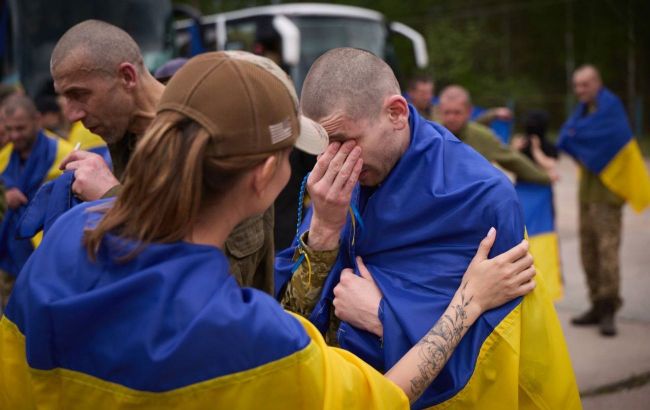Russia accused of blocking return of Azov fighters to deepen social divisions
 Photo: Russia is deliberately refusing to return some prisoners of war (t.me/V_Zelenskiy_official)
Photo: Russia is deliberately refusing to return some prisoners of war (t.me/V_Zelenskiy_official)
Russia is deliberately making it harder to bring home Ukrainian POWs who fall into particularly sensitive categories. This tactic is being used as a tool in its information war, aimed at sowing division within Ukrainian society, informs Andrii Yusov, Representative of the Defense Intelligence of the Ministry of Defense of Ukraine.
"The enemy is deliberately complicating the return of prisoners from especially sensitive categories," Yusov said.
According to him, Russia's goal is to provoke a public outcry and stir dissatisfaction among Ukrainians.
"They are even trying to exploit the issue of Ukrainian POWs as a tool to divide our society. However, unity, understanding, and resilience on this deeply painful issue for every Ukrainian family are disrupting the enemy's plans," he emphasized.
Yusov also noted that during the large-scale 1,000-for-1,000 prisoner exchange, Ukraine's Coordination Headquarters for the Treatment of Prisoners of War succeeded in securing the release of personnel from 46 military units of Ukraine's Defense and Security Forces.
"For the first time since the beginning of Russia's full-scale invasion. These are not only saved lives, but also priceless information and hope for many other captives and their families, for the whole country. Silence and responsibility — especially for those who know what this is about — will save thousands more Ukrainian lives," said the Representative of the Main Intelligence Directorate.
Return of Azov fighters from captivity
Following the final stage of the 1000-for-1000 exchange, Commander of the 1st Corps of Azov National Guard of Ukraine Denys Prokopenko, noted that not a single servicemember from the Azov Brigade was part of this swap.
The Main Intelligence Directorate later explained how the lists of prisoners were compiled for this round of exchanges.
Details of the 1,000-for-1,000 prisoner swap
The first stage of what has become the largest prisoner exchange since the start of Russia's full-scale invasion began on Friday.
A total of 390 people were released: 270 military personnel and 120 civilians. On the first day, Ukraine secured the release of troops from the Navy, Air Assault Forces, Territorial Defense Forces, the National Guard of Ukraine, and the State Border Guard Service of Ukraine.
On the second day — Saturday, May 24 — Ukraine brought home 307 defenders, including 27 fighters from Mariupol and personnel from several other units who had not previously been released.
Today, May 25, another 303 Ukrainians were freed, including 70 defenders of Mariupol.
RBC-Ukraine shared exclusive footage of the large-scale exchange, which the Security Service of Ukraine released.

